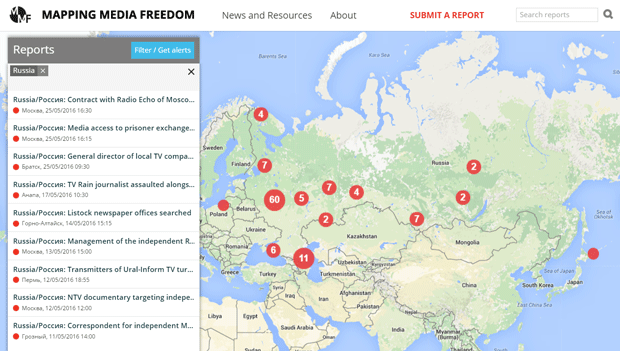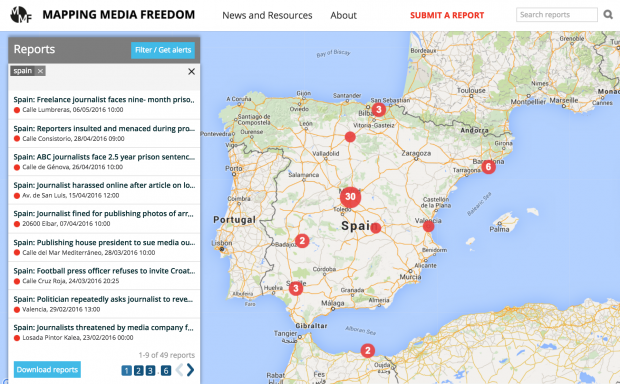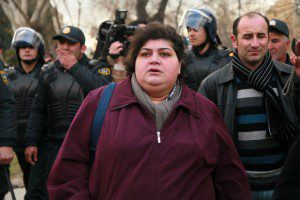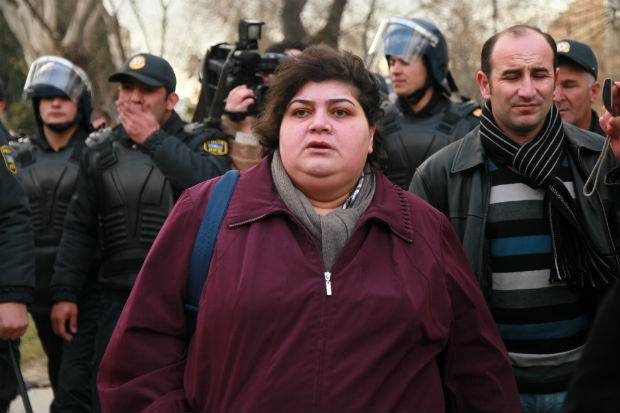2 Jun 2016 | Mapping Media Freedom, News and features, Russia

In Russia, business interests are protected by the state. When human rights violations or environmental damage are reported, nepotism and corrupt dealings between officials and business usually plays a large role. In these cases, no matter how serious the allegations or how strong the evidence, business owners skirt trouble while journalists and bloggers face real problems.
When copper and nickel ore deposits were discovered on the banks of the Khopyor River near a nature reserve in the Voronezhskaya oblast in 2012, the Ural Mining and Metallurgic Company (UGMK) was selected to exploit the deposits. Local residents and environmentalists protested when the company began prepping the site for extraction. Opponents were convinced that the development would cause environmental damage to the reserve and the river. Despite the objections, regional authorities granted UGMK permission to proceed with the project. In summer 2013 protests turned violent with clashes between the protesters and police and security hired by the company.
Research conducted by environmental activists and journalists uncovered alleged ties between UGMK’s owners, Iskander Makhmudov and Andrey Bokarev, and Kremlin-connected businessmen including Gennadi Timchenko and Vladimir Yakunin, close friends of the Russian president Vladimir Putin. The investigators also disclosed the involvement of several European companies.
Following the disclosures, two local activists, Mikhail Bezmensky and Igor Zhitenev, who published the information were accused of attempting to solicit a bribe from the company in order to halt the protests. Both were arrested and jailed. One more blogger, who faced threats, fled Russia and received political asylum in the EU.
Local mass media controlled by the department of property relations of the Voronezh region began spreading the allegation that a group of outsiders was trying to destabilise the situation. A Volgograd MP and businessman Oleg Pakholkov, sponsored by UGMK, launched Khozyaistvo Chernozyemya, a weekly newspaper with a circulation of about 60,000.
The paper routinely devoted five or six pages to laudatory coverage of nickel mining on the Khopyor, while the public protests were presented as a dirty competitive technique, an anti-state provocation, or a personal PR campaign of the protest activists. Other articles were about the positive experience of the Ural Mining and Metallurgic Company, the benefit of the project for the regional economy and its environmental safety.
Despite the ongoing protests mounted by opponents and periodic disclosures of corruption revealed by independent investigations UGMK continues to work on extracting the ore. The local activists still hope that Russia’s economic crisis, the collapse of commodity prices and their protests will help them stop the mining.
The UGMK investigations is just one example of the potential risks that journalists and bloggers face when they start publishing about Russia’s businesses.
In fact, a considerable part of the media rights violations in Russia reported to Mapping Media Freedom are against journalists who are prevented from reporting about corporations.
Officials and Putin-connected business owners who have been named in the Panama Papers leak have so far received full protection in the Kremlin-backed media while independent journalists and bloggers who reported on the disclosures have been accused of “undermining Russian interests for Western money” and face legal charges.
Aleksei Navalnyi, an opposition leader and the author of dozens of high-profile investigations into misconduct and corruption committed by state corporations has been charged three times since 2012 with crimes that he has not committed, including defamation and fraud.
The state has almost officially recognised that Navalnyi has been persecuted for his investigations. In 2013 Vladimir Markin, a spokesperson for Russia’s investigative committee, told the pro-Kremlin newspaper Izvestia that accusations against Navalnyi would not have been raised had the blogger not “teased power”.
In the last two months, three cases of journalists being targeted by corporate interests have been reported to Mapping Media Freedom.
On 12 April, while covering truckers who were protesting against the actions of transport company Omega, its director Evgeni Rutkovski attacked journalist Anton Siliverstov. When Siliverstov asked Rutkovski to comment on the protest, Rutkovsky forced Siliverstov from the office. The journalist said he would record the incident on his phone, at which point Rutkovski snatched the journalist’s device, refused to give it back and called security.
Two days later, reporter Igor Dovidovich was assaulted by the head of Gaz-Service, a gas company he was investigating. His TV crew was also attacked by the firm’s employees.
The month ended with state oil company Rosneft filing a judicial complaint against BiznessPress for an article which, the firm said, is “false and represents baseless fantasies of journalists or their so-called sources”.
Without support from news organisations or media laws to look to for protection, bloggers are often more vulnerable than journalists. While those reporting these crimes are often defenceless, those committing them often benefit.
27 May 2016 | Europe and Central Asia, Mapping Media Freedom, mobile, News and features, Spain

When Axier López, the 37-year-old reporter for the Basque-language magazine Argia, opened the mailbox at his home in Barakaldo early April, he discovered he’d become the first journalist in Spain to be punished under the Public Security Law.
He was ordered to pay €601 (£466) for photos of an arrest he published on Twitter without state permission on 7 March.
“It is a fine similar to a parking ticket,” López told Mapping Media Freedom. “Signed by a local government representative, it claims I committed a crime by putting on-duty police officers in danger.”
The photos in question were taken when López was in the city of Eibar covering the arrest of a woman who had previously refused to appear in court. In 2007 she had participated in a protest against the forced closure of a local youth organisation which the state and court linked to a Basque separatist terrorist group. The woman was accused of blocking a road.
The so-called “gag law” under which López was fined came into force on 1 June 2015. It bans coverage of on-duty police officers without prior police permission and prohibits the publication of any clue as to their identity. The Spanish centre-right government said the purpose of the law is to protect officer security.
“What is the problem if we track and inform the public about events involving police officers?” López asked. “Policemen are paid with public money, so I don’t see a problem if they appear in media content.”
“Almost every day you can see arrests of different people on TV, where police officers appear in front of the camera, but they punished only us,” he added.
Journalists in Spain have recently come under mounting legal pressures related to their work.
In April two journalists from the daily newspaper ABC, Pablo Muñoz and Cruz Morcillo, were facing two-and-a-half-year prison sentences for publishing a telephone conversation between members of the Italian mafia, who were talking about Luis Bárcenas, former treasurer of Partido Popular. After an avalanche of support for the journalists, the general attorney in Madrid dropped the charges in May.
The journalists had published their article in July 2014, a year after police investigators intercepted the phone conversation between two mafioso. The general attorney had claimed they revealed details of a secret police investigation.
“Charges, in this case, were really severe,” said Elsa González, president of the Spanish Federation of Journalist Associations (FAPE), the main journalist body in the country. “A journalist has to publish information if it’s in the public interest.”
González added that according to a poll by Madrid’s Association of Journalist (APM), last year only 23.2% of reporters with permanent contracts and 22.2% of freelancers said they never received pressure to modify information in their reports. APM said the pressure could come from multiple angles, including political and corporate powers, public institutions and advertisers.
A group of Spanish media companies has also recently been threatened with legal action after online newspapers El Confidencial and Eldiario.es, along with private TV channel La Sexta reported that Juan Luís Cebrián, president of the Prisa media group, publisher of the national newspaper El País and sports daily AS, appeared in the Panama Papers.
On 26 April Prisa issued a statement on its website stating that its president had taken legal action against the outlets for “clear defamatory intent” by linking Cebrián to the Panama Papers “in which he categorically does not appear”.
The centre-right daily newspaper El Mundo, a competitor of Prisa’s left-leaning daily El País, then reported that journalists who work for Prisa publishing house were prohibited from engaging with the three media outlets.
Nacho Cardero, director of El Confidencial, told Mapping Media Freedom that Cebrián has yet to take any formal action.
“At the moment there are no actions against any of the three media sources and furthermore, the intention to expel contributors of El Confidencial, La Sexta or Eldiario.es from his group, hasn’t occurred,” said Cardero. “However, Prisa has closed the door to Ignacio Escolar, director of Eldiario.es.”
López believes all these cases serve to spread fear among journalists. Meanwhile, his appeal against his fine has been refused. It could have been reduced to €300 (£232) if he had paid in 15 days. “However, we are not going to pay because we were doing our job,” he said.
“I don’t know where we can go in the legal process,” López added. “But it is important that the debate on this law is open and that we resist in order to prevent possible fear in other journalists.”
Mapping Media Freedom approached Cebrián for comment but received no response.
25 May 2016 | Azerbaijan, Azerbaijan News, Europe and Central Asia, mobile, News and features
 Azerbaijan’s Supreme Court has ordered the release of investigative journalist Khadija Ismayilova. But who is Ismayilova and why was she in prison?
Azerbaijan’s Supreme Court has ordered the release of investigative journalist Khadija Ismayilova. But who is Ismayilova and why was she in prison?
One of Azerbaijan’s most celebrated journalists, Ismayilova investigated, among other things, Azerbaijan’s human rights abuses and the corruption involving the family of president Ilham Aliyev. The recent Panama Papers have followed up on her work, exposing links between the president’s family and a network of offshore tax havens and hidden wealth.
Ismayilova was arbitrarily imprisoned in December 2014 and was sentenced in September 2015 to seven-and-a-half years in prison. Although she is officially charged with large-scale misappropriation and embezzlement, illegal entrepreneurship, tax evasion and abuse of official duties, it is widely believed that the real reason for Ismayilova’s imprisonment is her investigative journalism.
Before her arrest, Ismayilova had been subjected to a relentless campaign of intimidation and persecution, possibly orchestrated by the Azerbaijani authorities to discredit her investigative reporting on corruption amongst the highest levels of society.
“Khadija Ismayilova has suffered a serious invasion of her personal privacy through the installation of hidden cameras and wires in her flat and publication of secretly filmed videos among other incidents. Azerbaijan has a positive obligation to carry out an effective investigation into these violations,” said Camila Graham-Wood, legal officer at Privacy International.
Human rights lawyer Amal Clooney has been representing Ismayilova during her case at the European Court of Human Rights.
Her work was recognised by the United Nations which awarded her the prestigious Unesco/Guillermo Cano World Press Freedom Prize. When Ismayilova was in prison, her mother, Elmira Ismayilova, accepted the award on her daughter’s behalf. She read a statement Ismayilova wrote from prison: “As you gather here tonight, I ask you not to laud my work or my courage, but to dedicate yourself to the work each one of you can do on behalf of press freedom and justice.”
She read a statement Ismayilova wrote from prison: “As you gather here tonight, I ask you not to laud my work or my courage, but to dedicate yourself to the work each one of you can do on behalf of press freedom and justice.” Ljiljana Zurovac, president of the Unesco/Guillermo Cano World Press Freedom Prize 2016 jury, said: “Khadija Ismayilova highly deserves the prize and I am happy to see that her courage and professionalism are recognised.”
Azerbaijan is one of the lowest ranked countries for press freedom, being placed 163 out of 180 countries on the 2016 Reporters Without Border’s World Press Freedom Index.
Protests due to take place this Friday to mark Ismayilova spending her 40th birthday in prison will still go ahead to celebrate her release, call for her full acquittal and for the release of the country’s political prisoners, including Ilgar Mammadov, Seymur Hezi and Ilkin Rustemzade.
16 May 2016 | Azerbaijan, Azerbaijan News, Mapping Media Freedom, mobile, News and features

Khadija Ismayilova
Khadija Ismayilova, one of Azerbaijan’s most celebrated journalists, will be given the opportunity to appeal against the decision by the Baku Court of Appeal to imprison her.
The appeal will be heard by the Supreme Court of Azerbaijan on 25 May.
Ismayilova has been arbitrarily imprisoned since December 2014 and was sentenced on September 2015 to seven and a half years in prison. Although she is officially charged with large-scale misappropriation and embezzlement, illegal entrepreneurship, tax evasion and abuse of official duties, it is widely believed that the real reason for Ismayilova’s imprisonment is her investigative journalism.
Ismayilova investigated, among other things, Azerbaijan’s human rights abuses and corruption involving the family of president Ilham Aliyev, which has since been implicated in the Panama Papers for its hidden wealth.
Earlier this month, the United Nations recognised Ismayilova’s brave reporting and self-sacrifice with the prestigious Unesco/Guillermo Cano World Press Freedom Prize.
The journalist’s mother, Elmira Ismayilova, accepted the award on her daughter’s behalf. She read a statement Ismayilova wrote from prison: “As you gather here tonight, I ask you not to laud my work or my courage, but to dedicate yourself to the work each one of you can do on behalf of press freedom and justice.”
Ljiljana Zurovac, president of the Unesco/Guillermo Cano World Press Freedom Prize 2016 jury, said: “Khadija Ismayilova highly deserves the Prize and I am happy to see that her courage and professionalism are recognised.”
The appeal will take place two days before the journalist’s 40th birthday. To mark Ismayilova’s birthday and call for her immediate and unconditional release, the Sport for Rights campaign is collaborating with others, including Index on Censorship, to co-ordinate a series of parallel protests in cities around the world.



 Azerbaijan’s Supreme Court has
Azerbaijan’s Supreme Court has 